| Srl | Item |
| 1 |
ID:
137602
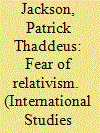

|
|
|
|
|
| Summary/Abstract |
Although scholars toss around the word “relativism” when debating the merits of various methodological approaches in international studies, there is a lack of clarity about what it might mean to have a relativist position on the production of social-scientific knowledge. As a result, a lot of the ink spilled about the potential dangers of relativism is overblown. A little philosophical and logical clarity goes a long way towards dispelling that particular bogeyman.
|
|
|
|
|
|
|
|
|
|
|
|
|
|
|
|
| 2 |
ID:
081204


|
|
|
|
|
| Publication |
2008.
|
| Summary/Abstract |
While the recent proliferation in philosophical discussions in International Relations indicates a welcome increase in the discipline's conceptual sophistication, a central issue has gone relatively unremarked: the question of how to understand the relationship between scholarly observers and their observed objects. This classical philosophical problem has a number of implications for the conduct of inquiry in the discipline, and raises particular challenges for the status of knowledge-claims advanced by constructivists. I clarify these issues and challenges by distinguishing between 'dualist' and 'monist' ontological standpoints, in the hope of provoking a more focused philosophical discussion
|
|
|
|
|
|
|
|
|
|
|
|
|
|
|
|
| 3 |
ID:
152339
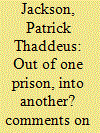

|
|
|
|
|
| Summary/Abstract |
This intervention, while highlighting points of agreement with Rosenberg’s arguments, also challenges Rosenberg’s characterization of the discipline. Specifically, this short intervention takes issue with the image of the field as International Relations as a discipline and multiplicity as its proposed core notion.
|
|
|
|
|
|
|
|
|
|
|
|
|
|
|
|
| 4 |
ID:
092335
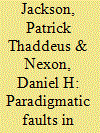

|
|
|
|
|
| Publication |
2009.
|
| Summary/Abstract |
American scholars routinely characterize the study of international relations as divided between various Kuhnian "paradigms" or Lakatosian "research programmes." Although most international relations scholars have abandoned Kuhn's account of scientific continuity and change, many utilize Lakatosian criteria to assess the "progressive" or "degenerative" character of various theories and approaches in the field. We argue that neither specific areas of inquiry (such as the "democratic peace") nor broader approaches to world politics (such as realism, liberalism, and constructivism) deserve the label of "paradigms" or "research programmes." As an alternative, we propose mapping the field through Weberian techniques of ideal-typification.
|
|
|
|
|
|
|
|
|
|
|
|
|
|
|
|
| 5 |
ID:
119994
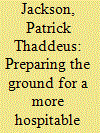

|
|
|
|
|
| Publication |
2013.
|
| Summary/Abstract |
In this reply, I take up three issues raised by the other contributors to this discussion of my book: the purpose of the intervention, the epistemic status of the typology and the question of progress in science.
|
|
|
|
|
|
|
|
|
|
|
|
|
|
|
|
| 6 |
ID:
168763
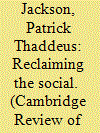

|
|
|
|
|
| Summary/Abstract |
Even in the North American and European context, relationalism comes in many flavours. We identify the common features of relational approaches, including varieties of practice theory, pragmatism and network analysis. We also identify key disagreements within relationalism, such as the relative explanatory importance of positional and process-oriented analysis. Our discussion reveals the problems that come from associating relationalism solely with other clusters of international-relations theory, such as constructivism. It also allows us to construct a typology of major relational frameworks in the field, and provides a better foundation for comparing and contrasting Chinese and Western relationalisms.
|
|
|
|
|
|
|
|
|
|
|
|
|
|
|
|
| 7 |
ID:
076862
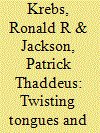

|
|
|
|
|
| Publication |
2007.
|
| Summary/Abstract |
While scholars of International Relations and comparative politics have usually treated rhetoric as epiphenomenal, one strand of constructivism has recently returned rhetoric to the heart of political analysis, especially through the mechanism of persuasion. We too maintain that rhetoric is central to political processes and outcomes, but we argue that persuasion is theoretically and methodologically problematic. We aver that rhetoric's role may be more usefully conceptualized in the context of coercion, and we advance a stylized model that illustrates how rhetorical coercion operates, explains why it works, and identifies key scope conditions. We subsequently illustrate our model's relevance through a detailed examination of a 'hard' case. This article's agenda is twofold. First, it advises scholars in these fields to avoid focusing on unanswerable questions about actors' motives and to examine instead what actors say, in what contexts, and to what audiences. Second, it lays the groundwork for a 'coercive constructivism', complementing the liberal version so prevalent today
|
|
|
|
|
|
|
|
|
|
|
|
|
|
|
|